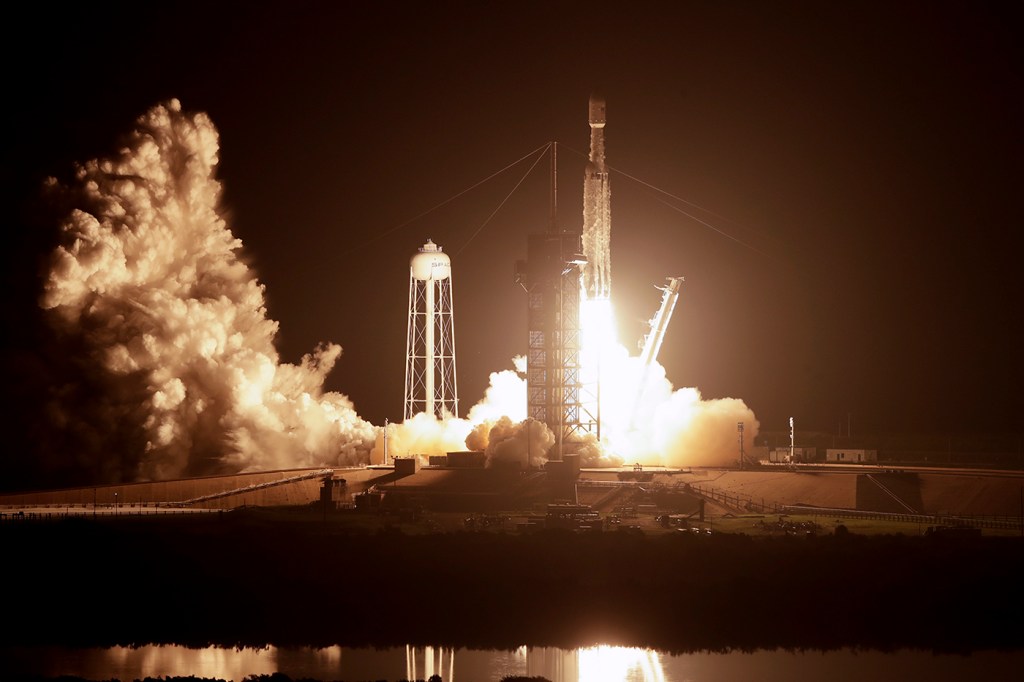On the 50th anniversary of the moon landing, correcting the record of the Cold War Space Race to determine if we’ve entered Space Race 2.0

As the 50th anniversary of the moon landing hovers on the horizon, a new boom of investment and energy for space exploration is taking off, says Mai’a Cross, a professor of political science and international affairs at Northeastern University. Private companies such as SpaceX and Boeing are competing to launch commercial flights into space at the same time that countries across the globe are beefing up space programs in order to reach Mars and the moon (again).
“We’re at a time when space is becoming very prominent in a way that it hasn’t, for the last 50 years,” says Cross, whose newest research focuses on the international collaboration that fostered the Space Race of the 1960s.
Space exploration “has always been about international cooperation and the betterment of humanity,” Cross says. But politicians and military officials viewed space “as a battlefield, as an arms race,” she says.

Mai’a Cross, an associate professor of political science and international affairs at Northeastern. Photo by Adam Glanzman/Northeastern University
Cross, who has been invited to speak at international conferences on space exploration, says there’s a stark difference between the way space explorers and scientists talk about space and the way government officials and military officials discuss it.
Scientists, such as those at the International Astronautical Congress held most recently in Germany, see space exploration “as an opportunity for industry to thrive, for exploration, and they see the rivalry among various [government and private organizations] as a healthy thing to spur innovation,” she says.
Government and military officials, such as those at the Space Security Conference in Geneva, Switzerland, this year, describe space missions as necessary in order to “prepare for war in space,” she says.
Cross is concerned that if a militaristic vision of space wins out, the last frontier could become a battleground instead of a fertile source for exploration and information among scientists of the world.
Space Race 1.0
There’s a common misconception about the 1960s Space Race, Cross says: that it was another arena in which the Cold War between the U.S. and the Soviet Union played out, pitting two countries against each other in a bitter race to outer space.
As the story goes, when the Soviets launched Sputnik—the world’s first satellite to orbit Earth—into space on Oct. 4, 1957, it surprised the world and caused a wave of fear to ripple across the U.S.
This is only partially true, says Cross, who is the Edward W. Brooke Professor of Political Science, and who did extensive research at the John F. Kennedy historical archives and at NASA headquarters.
The Space Race did indeed occur in the middle of the Cold War, the two countries did compete with each other to be the first in space, and people were surprised the Sputnik launched on the day it did. But the competition wasn’t bitter, and Sputnik didn’t come out of nowhere, she says.
In 1957-58, the U.S. created the International Geophysical Year, a concentrated period when scientists from around the world worked together to study the world and beyond. In all, 67 countries, including the Soviet Union and the U.S., and roughly 60,000 scientists, participated.
“One of the stated goals of the International Geophysical Year was to put a satellite into orbit,” Cross says. “So people knew it was the goal and that it was going to happen; all the data was shared. They may not have known the exact day [Sputnik would launch], but they knew it was going to happen.”
The U.S. government took opinion polls after the Sputnik launched, Cross says. “Those polls showed unequivocally that the American public was not afraid after Sputnik,” she says.
According to Cross, Roger Launius, the former chief historian for NASA, wrote, “Most Americans seemed to recognize that the satellite did not pose a threat to the United States and instead congratulations ensued and many people seemed excited by the Soviet success…it seems a generation of Americans embraced the dawn of the Space Age as a symbol of progress and a better future both on Earth and beyond.”
Rather, Cross says, it was a political spin by Lyndon Baines Johnson, a U.S. senator at the time, and a young presidential candidate, John F. Kennedy, in 1959-60, that stoked the fear of a Soviet ballistic missile attack among U.S. citizens.
Sputnik, and Soviet Union goals for space in general “became a politically framed narrative to help him get elected,” Cross says. Kennedy flipped his viewpoint a few years later, when he delivered a stirring speech in favor of sending a man to the moon.
Cross says that during the course of her research she also found “a bipartisan, formal proposal for a U.S.-Soviet joint moon landing,” among “piles of proposals” for space activities that would’ve required extensive cooperation among the two nations.
Indeed, the U.S. and Russia worked together to launch the International Space Station in 1998, which is considered one of the largest civil cooperation programs in history, Cross says.
That the Space Race is largely remembered today as a battle between two global forces—rather than an international collaboration spurred by healthy competition—is evidence that the view that space is a security dilemma has staying power, Cross says.
Space Race 2.0?
In 2007, the Chinese government used an anti-satellite weapon to destroy one of its own satellites in orbit. Though China only targeted its own satellite, the action caused an international uproar in part because such technology could be used to impede another country’s ability to collect information from its satellites. (The exploded satellite also created a huge amount of debris that’s still floating around the Earth’s orbit, another reason that countries were concerned after the launch.)
In June 2018, U.S. President Donald Trump called for the creation of a sixth branch of the U.S. military called Space Force. It would be responsible for “undertaking missions and operations in the rapidly evolving space domain,” according to information available by the U.S. military.
And at the end of March 2019, the Indian government launched an anti-satellite missile that hit and destroyed one of its own satellites. Like the Chinese launch more than a decade earlier, the move alarmed other countries, Cross says.
The paradox inherent within each of these actions, Cross says, is that space is not, and never has been, weaponized. “There’s no capacity to shoot Earth from space,” Cross says.
But the fact that countries including China, the U.S., and India, as well as Japan and Russia, are developing military capabilities in case space becomes weaponized represents a “classic international relations theory,” she says, wherein the leaders of countries misinterpret each other’s actions until the outcome they fear comes true.
“All the actors involved find themselves in a race to reach superiority or dominance, and they’re so driven by panic that before you know it everyone is armed to the teeth and you have weaponized a place that is supposed to be a global commons,” Cross says.
Cross is concerned that the way the major players in space exploration today are preparing space-based military operations is eerily similar to the rhetoric used by international leaders in the 1960s, and could potentially create a security dilemma in space where there never was one.
“The benefits of space research for people on Earth are huge,” Cross says. “Each step of the way, [space exploration] has been characterized by this wild imagination, this dreamy, outside-the-box thinking, and there’s a sense that this is part of what it is to be human—pushing the limits of what you can do. The danger is when we feel like we have to weaponize, or go it alone.”
To commemorate the 50th anniversary of the first lunar landing, News@Northeastern is exploring space July 15 to July 19. Starting Monday, we will use the Boston Globe’s Library Collection at Northeastern’s Archives and Special Collections to highlight the space program and the role the university had in the landing.
For media inquiries, please contact Shannon Nargi at s.nargi@northeastern.edu or 617-373-5718.





